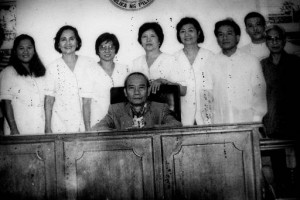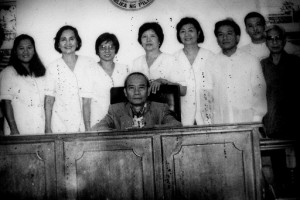LAOAG CITY, Ilocos Norte – After 10 years, the unsolved case of Judge Ariston Rubio, known as the first judge killed in the chronicles of extrajudicial killings in the country, has been declared “probationary closed” by the National Bureau of Investigation
“This is quite disturbing,” said Mariano Nalupta Jr., chapter president of the Ilocos Norte Integrated Bar of the Philippines.
Slain in a broad daylight along the national highway in Barangay Magnuang, Batac (now a city) on Oct. 31, 2001, the half-inch-thick case folder of Rubio has never been opened when the Philippine National Police gave up in 2004 after three years of probing.
Polgino Rivera, NBI officer-in-charge of the case, said during a consultative meeting held at the Capitol session hall on Jan. 31 that the Rubio case has been temporarily closed after 10 years of no progress in its investigation.
Rivera, however, clarified that the case may be reopened at anytime whenever new evidence or a credible witness comes out.
The consultative meeting was called by the Sangguniang Panlalawigan’s (Provincial Legislative Council’s) committee on peace and order chaired by board member Fidel Cimatu in response to a resolution from the IBP-Ilocos Norte chapter to give an update on the unsolved killings of court judges and lawyers.
After Rubio’s killing in 2001, about a dozen lawyers and another judge in Northern Luzon had been slain during former president Gloria Macapagal Arroyo’s administration.
Nalupta expressed his apparent dismay over the increasing number of killings, including that of several PNP members, saying “they (PNP) can’t even solve the death of their brothers.”
“It’s very hard to become a lawyer,” the former Ilocos Norte vice governor said. “We value the lives of lawyers because they are like our brothers and sisters.”
At the time of his death, Rubio, executive judge of the Regional Trial Court Branch 17 in Batac, was handling controversial electoral and criminal cases.
Nalupta urged concerned authorities to regularly update the IBP on the progress of their investigation for monitoring purposes.
On the part of the Department of Justice (DOJ), Acting Provincial Prosecutor Maria Calija said, “We are more than willing to cooperate as long as you (PNP) inform us (of the case).”
Although there is a DOJ circular requiring the presence of a prosecutor immediately at the crime scene to help in determining the probability of evidence gathered by investigators, the PNP still requested the IBP to send a lawyer to assist in the investigation to help avoid the dismissal of court cases due to technicalities.
Members and officers of the IBP, NBI, PNP and the DOJ agreed in front of the Ilocos Norte board members during the dialogue to intensify closer coordination for the speedy resolution of cases.
Provincial board member Vicentito Lazo, who is also a lawyer by profession, said the PNP should be given a “white board” to be placed visibly in their office as a daily reminder of cases waiting to be solved.
Board member Cimatu, who presided over the meeting in his capacity as chairperson of the committee on peace and order, backed Lazo’s suggestion. Cimatu was a retired general of the PNP before he was elected as board member in 2010.
“The police tend to forget to follow up old cases as they (PNP) tend to think only of the present,” Cimatu observed.
“We won’t stop until justice is served to the family of the victims,” PNP Provincial Director Marlou Chan quipped.
Chan said the PNP has a computerized tracking system for police investigation and monitoring purposes.
Based on police reports presented during the meeting, cases have been filed in court for the killings of four lawyers while one of the three suspects in a similar case was arrested recently.
The Rubio case is among an estimated 32 percent of 305 EJK cases audited last year that remain unsolved by the police.

